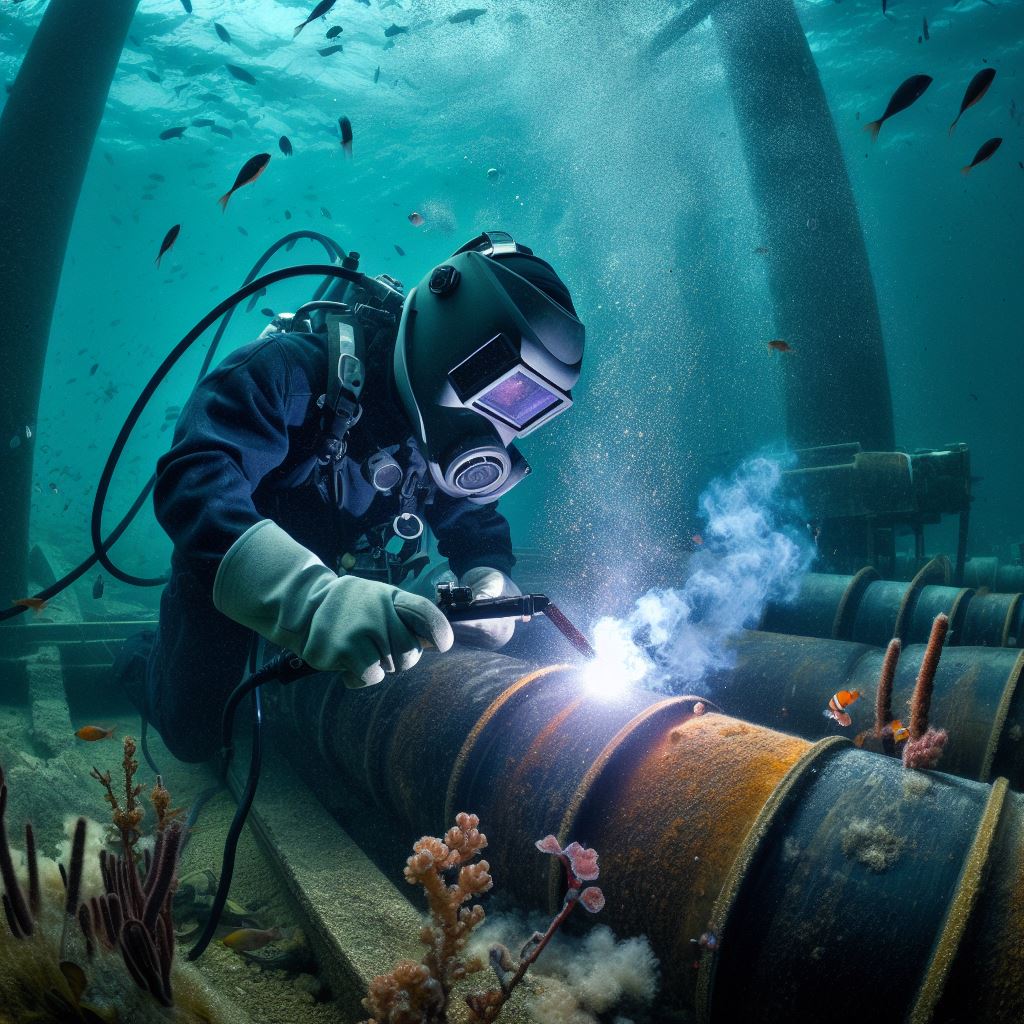Introduction to underwater welding
Underwater welding is an innovative technique used to join metals underwater. It plays a crucial role in various industries such as offshore construction, oil and gas, and marine salvage.
This specialized field has gained significant importance due to its unique applications and challenges.
Underwater welding involves using high-intensity welding equipment and diving gear to carry out welding operations in underwater environments.
This technique is essential for repairing structures such as pipelines, ships, and oil rigs that are submerged in water.
The significance of underwater welding lies in its ability to provide efficient and cost-effective solutions for repairing and maintaining underwater structures.
This technique eliminates the need for expensive and time-consuming dry-docking procedures, allowing repairs to be done directly in the water.
In the UK, the demand for underwater welding has grown steadily over the years.
The country’s extensive coastline and its dependence on offshore activities have contributed to the expansion of this specialized field.
Moreover, the UK’s offshore wind industry has also created a significant demand for underwater welding services.
The growth of underwater welding in the UK has led to the establishment of training programs and the development of advanced technologies.
These advancements have further enhanced the safety and efficiency of underwater welding operations in the country.
In general, underwater welding is a niche field that plays a vital role in various industries. Its applications and importance cannot be undermined, especially in the UK, where underwater activities are prevalent.
The growth of underwater welding in the country reflects its significance and potential for further development.
Read: Safety Practices for Carpenters in the UK
Requirements and qualifications for underwater welders
Underwater welding is a highly specialized field that requires a unique set of skills and certifications.
Personalized UK Career Consulting
Receive tailored career guidance designed just for you. Get actionable steps and expert support to boost your career in 1-3 days. Take control of your career now.
Get StartedTechnical skills required for underwater welding
- Proficient in both welding techniques and underwater diving
- Ability to use welding equipment, including cutting torches and electrodes.
- Knowledge of welding procedures and safety protocols
- Understanding of different types of materials and their compatibility with welding
Importance of professional certifications
- Certifications ensure that underwater welders have met specific industry standards.
- Provide proof of competency and expertise in the field
- Increase job opportunities and earning potential.
- Give clients confidence in the welder’s skills and professionalism.
Physical and mental demands of the job
- Underwater welding requires excellent physical fitness and stamina.
- Ability to work in challenging environments with limited visibility and high-water pressure.
- Mental resilience to handle potentially dangerous situations and make split-second decisions.
- Strong problem-solving and critical thinking skills
Training programs and courses available in the UK
- The United Kingdom offers various training programs for aspiring underwater welders.
- These programs provide a combination of classroom learning and hands-on practical training.
- Some of the recognized training organizations in the UK include the Diver Certification Board of Canada and the UK’s Health and Safety Executive
- Courses cover topics such as diving physics, welding techniques, safety procedures, and equipment usage.
In essence, becoming an underwater welder in the UK requires a unique skill set, professional certifications, physical and mental stamina, and specialized training.
However, for those passionate about welding and diving, this niche field can offer exciting opportunities and a rewarding career.
Read: Major Plumbing Issues in UK Homes
Safety considerations in underwater welding
Underwater welding demands specialized expertise, facing hazards like electric shock, explosions, and decompression sickness.
Safety measures include insulating gloves, harnesses, and welding screens. Adherence to strict protocols involves pre-dive briefings and equipment checks.
Dive teams and support personnel monitor, respond, and assist during welding, playing a vital safety role. In the UK, the Health and Safety at Work Act 1974 mandates a secure work environment.
Diving at Work Regulations 1997 adds specifics for diving operations, covering training, fitness, and equipment.
Training for divers and welders is crucial for hazard understanding and safety procedures. Dive teams undergo rigorous underwater welding, emergency response, and first aid training.
Welders receive specialized underwater welding equipment operation and hazard handling training. Regular equipment inspections and maintenance are vital for accident prevention.
Dive teams ensure compliance and conduct safety audits and risk assessments. Health and safety officers oversee protocol implementation and regulatory adherence.
Incidents prompt thorough investigations to prevent future occurrences and enhance safety. Safety standards improvement relies on learning from incidents and continuous training.
In essence, underwater welding safety centers on mitigating hazards through compliance, equipment use, and the diligence of dive teams, with ongoing training and incident analysis enhancing overall safety.
Read: The Impact of Brexit on UK Plumbing

Challenges and Rewards of Being an Underwater Welder in the UK
Underwater welding is a unique and challenging profession that offers numerous opportunities for career progression and personal fulfillment.
Your Dream Job Starts with a Perfect CV
Get a tailored CV and cover letter that captures your unique strengths and stands out in your industry. Let us help you make an unforgettable first impression.
Get StartedDespite the many difficulties faced by underwater welders, the rewards of this niche career make it an attractive choice for adventurous individuals.
Unique Challenges Faced by Underwater Welders
- Working in extreme conditions: Underwater welders often face harsh and unpredictable environments, including strong currents, low visibility, and extreme temperatures.
- High physical demands: The job requires welders to carry heavy equipment and work for extended periods in challenging positions, which can be physically exhausting.
- Risks to personal safety: Underwater welders face potential hazards such as electrical shocks, explosions, and the risk of being entangled in underwater structures.
- Health concerns: Constant exposure to cold water, diving depths, and high pressure can lead to various health issues, including decompression sickness and hypothermia.
Opportunities for Career Progression and Specialization
Despite the challenges, underwater welding offers exciting opportunities for career growth and specialization.
- Technical advancements: The field of underwater welding is constantly evolving with new technologies and techniques, allowing welders to continuously expand their skills.
- Certification and training: Various certifications and specialized training programs are available to diversify expertise and improve job prospects.
- Salary potential: As experienced underwater welders gain skill and reputation; they can earn competitive salaries and enjoy a higher standard of living.
- Supervisory and teaching roles: Successful underwater welders can progress to supervisory positions or become instructors to pass on their knowledge and skills to future generations.
Potential for Travel and Diverse Projects
One of the most rewarding aspects of being an underwater welder is the opportunity to work on diverse projects in different locations.
- Travel opportunities: Underwater welders can travel to various coastal areas, offshore oil rigs, and underwater structures, exploring different parts of the UK and even other countries.
- Working on major projects: From constructing bridges and tunnels to repairing offshore infrastructure, underwater welders contribute to significant engineering projects that shape the world around us.
- Collaboration with diverse teams: Underwater welding often involves working alongside professionals from different fields, fostering teamwork and creating a rich and diverse work environment.
Job Satisfaction and Personal Fulfillment in a Niche Profession
Despite the challenges and risks, underwater welders find immense satisfaction in their unique profession.
- Sense of achievement: Successfully completing complex welding tasks in challenging underwater conditions brings a great sense of accomplishment.
- Impact on infrastructure: By repairing and maintaining underwater structures, underwater welders contribute to the safety and longevity of critical infrastructure systems.
- Thrill of exploration: Being underwater and exploring uncharted environments provides an exhilarating experience that few other professions can offer.
- Pioneer spirit: Underwater welding remains a relatively undiscovered field, attracting individuals with a pioneering spirit who are willing to embrace the unknown.
Essentially, being an underwater welder in the UK comes with its images for a blog post with the topic “Underwater Welding: A Niche in the UK” share of challenges, but the rewards are equally remarkable.
With opportunities for career progression, diverse projects, travel, and personal fulfillment, this niche profession continues to attract those seeking an adventurous and fulfilling career path.
Read: Commercial vs. Residential Plumbing in UK
Conclusion
Underwater welding holds significant importance in the UK as it plays a vital role in maintaining and repairing various underwater structures.
The demand for skilled and certified underwater welders is expected to grow in the coming years, offering ample opportunities for aspiring professionals in this niche field.
To all those passionate about underwater welding, I encourage you to pursue your dreams and turn your passion into a successful career.
With proper training, certification, and dedication, you can become a highly sought-after underwater welder, contributing to the development of the UK’s underwater infrastructure.
As the industry continues to evolve, the future prospects of underwater welding in the UK look promising.
With an increasing need for offshore wind farms, oil and gas exploration, and marine construction projects, the demand for underwater welders will continue to rise.
Furthermore, technological advancements and innovative welding techniques are expected to enhance the efficiency and safety of underwater welding operations.
Optimize Your LinkedIn for Success
Boost your LinkedIn profile with a professional bio, keyword-rich headline, and strategic recommendations that attract recruiters. Stand out from the crowd and get noticed.
Optimize NowThis will not only create more job opportunities but also ensure a higher level of productivity and quality work in the industry.
In summary, underwater welding is not just a niche but a challenging and rewarding profession in the UK.
With dedication and the right skill set, aspiring underwater welders can have a successful and fulfilling career in this field.
So, if you have the passion, don’t hesitate to dive into the world of underwater welding and contribute to the growth of the country’s marine infrastructure.
[E-Book for Sale]
500 Cutting-Edge Tech Startup Ideas for 2024 & 2025: Innovate, Create, Dominate
$19.99 • 500 Tech Startup Ideas • 62 pages
You will get inspired with 500 innovative tech startup ideas for 2024 and 2025, complete with concise descriptions to help you kickstart your entrepreneurial journey in AI, Blockchain, IoT, Fintech, and AR/VR.




